End Stage Renal Disease (ESRD) Management in Gorakhpur
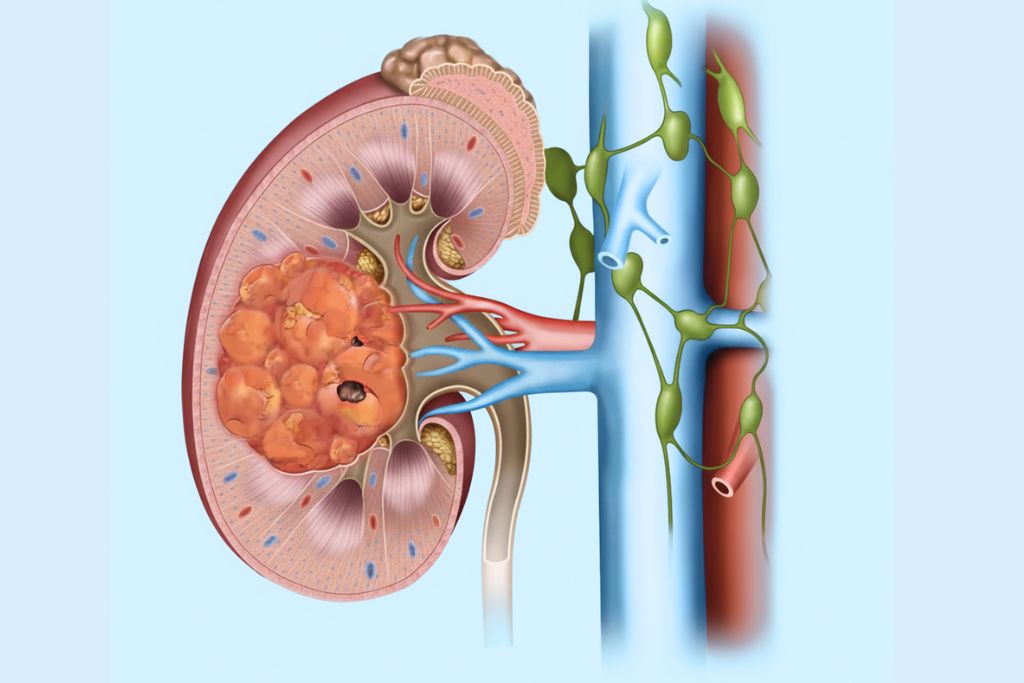
What is End Stage Renal Disease (ESRD)?
End Stage Renal Disease (ESRD) represents the final stage of chronic kidney disease (CKD), where the kidneys can no longer perform their essential functions. Patients with ESRD require continuous medical supervision, dialysis, or kidney transplantation to sustain life. Effective ESRD management is critical not only to prolong life but also to maintain a good quality of life.
In Gorakhpur, Dr. Arpit Srivastava, a leading nephrologist, offers comprehensive End Stage Renal Disease (ESRD) management. With years of experience in dialysis, kidney transplants, and kidney care, he provides personalized solutions to help patients navigate the complexities of advanced kidney disease.
ESRD occurs when kidney function declines to less than 15% of normal capacity. At this stage, kidneys fail to remove waste products, excess fluids, and toxins from the body. If left untreated, ESRD can lead to severe complications, including heart disease, bone disorders, and life-threatening electrolyte imbalances.
+91-7054357996Causes of ESRD
Several conditions can lead to End-Stage Renal Disease (ESRD):
- Chronic Kidney Disease (CKD): Progressive kidney damage due to diabetes, hypertension, or glomerulonephritis.
- Diabetes: Poorly controlled blood sugar can damage kidney filtration units.
- Hypertension: High blood pressure can accelerate kidney deterioration.
- Polycystic Kidney Disease (PKD): Genetic disorder causing cysts that impair kidney function.
- Other Kidney Disorders: Repeated infections, urinary tract obstructions, or autoimmune conditions.
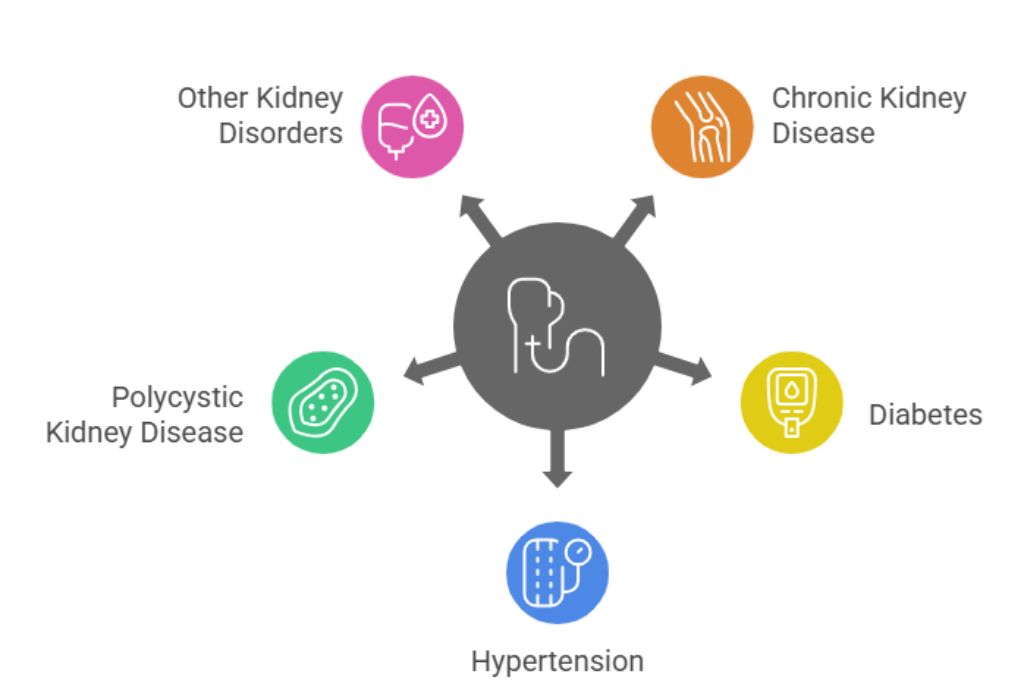
Symptoms of ESRD
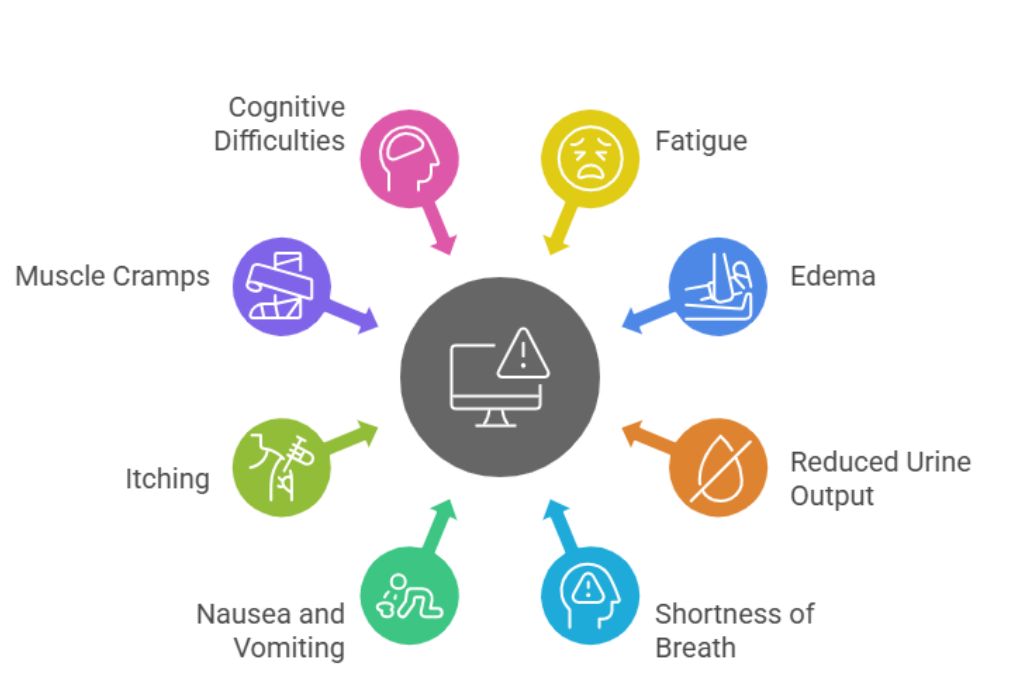
Patients with advanced kidney issues may experience:
- Persistent fatigue and weakness
- Swelling in legs, ankles, and face (edema)
- Reduced or no urine output
- Shortness of breath due to fluid accumulation in the lungs
- Nausea, vomiting, or loss of appetite
- Itching due to toxin buildup
- Muscle cramps and cognitive difficulties
Early recognition and management are crucial for stabilizing health and preparing for life-saving interventions.
Comprehensive ESRD Management Services in Gorakhpur
Dialysis Support
For ESRD patients, dialysis is life-sustaining. Dr. Arpit Srivastava provides both hemodialysis and peritoneal dialysis, tailored to the patient’s condition:
Hemodialysis
- Conducted at a specialized dialysis center under expert supervision.
- Blood is filtered through a dialyzer to remove toxins and excess fluids.
- Treatment schedules are customized to patient needs, typically three times a week.
Peritoneal Dialysis
Vascular Access Management
Reliable vascular access is critical for effective dialysis. Dr. Srivastava provides expert care for:
- AV Fistula Creation and Maintenance: Preferred long-term access for hemodialysis.
- AV Graft Placement: Synthetic alternatives when veins are unsuitable for a fistula.
- Permacath and Jugular Catheter Management: Temporary or emergency access for urgent dialysis.
Proper monitoring and maintenance of vascular access reduce the risk of infections, blockages, and complications.
Medication and Symptom Management
ESRD management involves careful monitoring and treatment of:
- Blood Pressure: Preventing cardiovascular complications.
- Anemia: Administering medications and supplements to improve hemoglobin levels.
- Electrolytes: Balancing potassium, sodium, calcium, and phosphorus levels.
- Fluid Overload: Controlling water retention to prevent swelling and heart strain.
Individualized medication plans help maintain stability and improve overall well-being.
Lifestyle and Nutritional Counseling
Diet and lifestyle play a vital role in ESRD management:
- Kidney-Friendly Diet: Low in sodium, potassium, and phosphorus to prevent complications.
- Fluid Management: Regulating intake based on dialysis schedule and kidney function.
- Exercise: Light physical activity to improve circulation, reduce fatigue, and enhance mood.
- Mental Health Support: Counseling and stress management to support emotional well-being.
Patients receive detailed guidance on nutrition, hydration, and lifestyle adjustments to support long-term kidney health.
Long-Term Planning and Kidney Transplant Preparation
ESRD patients often benefit from kidney transplantation as a definitive treatment:
- Pre-Transplant Evaluation: Assessing overall health, compatibility, and readiness.
- Post-Transplant Care: Monitoring and managing immunosuppressive therapy.
- Continuous Support: Integrating dialysis, medications, and lifestyle guidance to prepare for a successful transplant.
Dr. Srivastava ensures that every patient receives comprehensive planning for both immediate and long-term kidney care.
Risks and Complications of ESRD if Untreated
Without proper management, ESRD can result in:
- Heart disease and stroke due to fluid overload and hypertension.
- Bone and mineral disorders causing pain and fractures.
- Severe anemia leading to fatigue and reduced oxygen delivery.
- Increased susceptibility to infections.
- Reduced life expectancy and declining quality of life.
Patients receive clear instructions for:
- Medication adherence and dosage management.
- Recognizing warning signs like swelling, shortness of breath, or fever.
- Regular monitoring and follow-up appointments for early detection of complications.
- Maintaining a healthy lifestyle to support dialysis and kidney function.
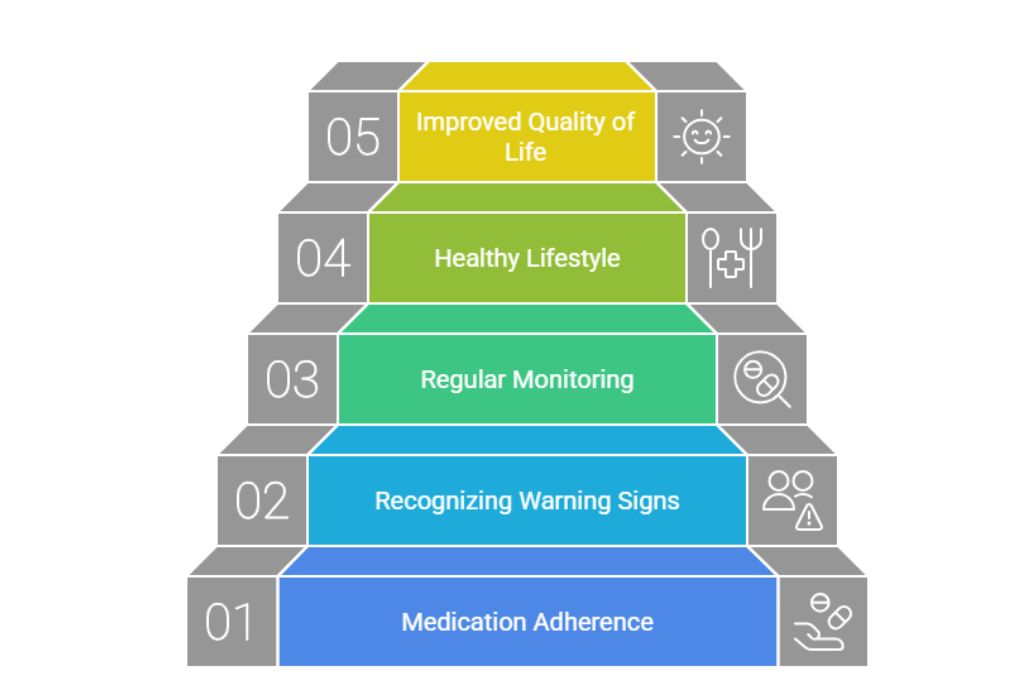
Why Choose Dr. Arpit Srivastava for ESRD Management in Gorakhpur?
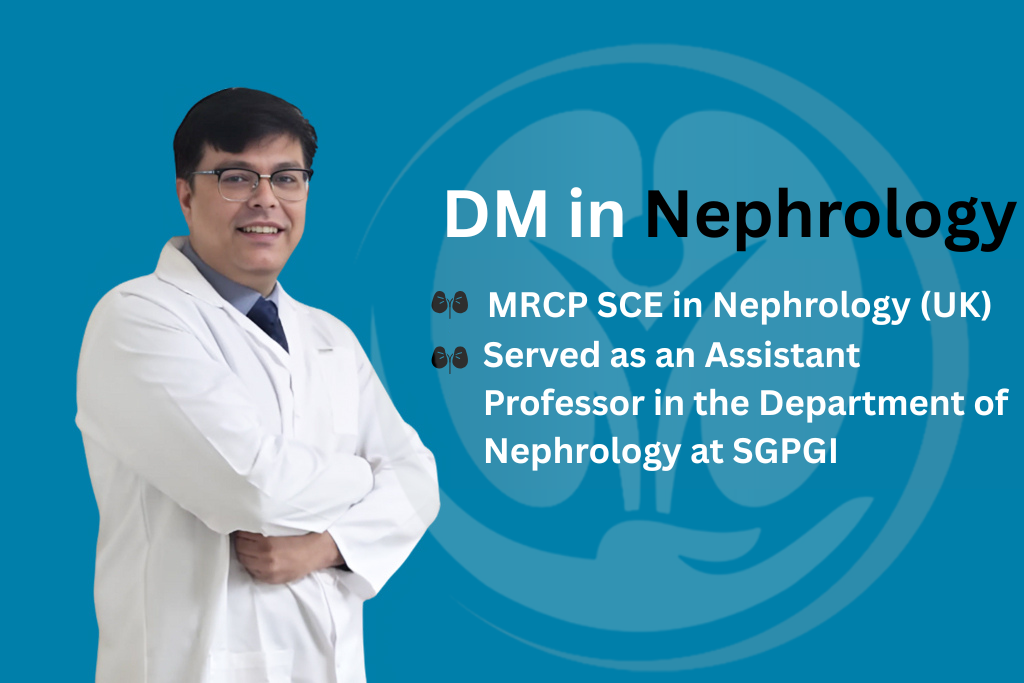
Patients in Gorakhpur trust Dr. Srivastava for:
- Expert Credentials: DM in Nephrology from SGPGI, Lucknow, and MRCP SCE Nephrology (UK).
- Extensive Experience: Managing advanced CKD, dialysis, vascular access, and kidney transplants.
- Patient-Centered Care: Tailored treatment plans addressing individual needs and preferences.
- Advanced Technology: Modern dialysis equipment and imaging for precise interventions.
- Comprehensive Support: From diagnosis to dialysis and transplantation, all under one roof.
Frequently Asked Questions
Call to Action
For comprehensive End Stage Renal Disease (ESRD) Management in Gorakhpur, trust Dr. Arpit Srivastava to provide personalized, expert care. From dialysis and vascular access to medication management and transplant planning, every patient receives holistic support for kidney health.
Callout: Take control of your kidney health with expert ESRD management in Gorakhpur. Schedule a consultation with Dr. Arpit Srivastava today for comprehensive care and guidance.
What is ESRD and how is it diagnosed?
ESRD is the final stage of CKD, diagnosed through blood tests, urine analysis, and imaging that show severe reduction in kidney function.
How often will I need dialysis?
Most patients require hemodialysis 3 times a week, while peritoneal dialysis schedules vary based on individual needs.
Can I manage ESRD at home?
Peritoneal dialysis allows home management with proper training and monitoring. Hemodialysis typically requires treatment at a specialized center.
What lifestyle changes are necessary?
A kidney-friendly diet, fluid restriction, moderate exercise, stress management, and regular medical follow-ups are essential.
When should I consider a kidney transplant?
Patients with ESRD may be evaluated for transplantation when dialysis is needed long-term or when overall health allows.
Let's Connect
Room no 19, Second Floor, Regency Hospital, Plot No-623, Medical College Road, Gulhariya, Gorakhpur, Uttar Pradesh 273013
Hours:
- ● Monday: 10 am – 5 pm
- ● Tuesday: 10 am – 5 pm
- ● Wednesday: 10 am – 5 pm
- ● Thursday: 10 am – 5 pm
- ● Friday: 10 am – 5 pm
- ● Saturday: 10 am – 5 pm
- ● Sunday: Closed
Help Is Here—Call Now!
Immediate support is just a call away. Reach out now and let us take care of the rest.



.png)